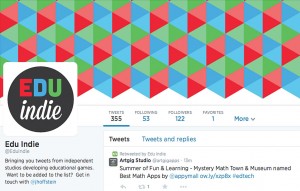Independent game developers often flood regional meetups to discuss their latest Unity projects or brainstorm marketing ideas to find a home in the App Store and Jenna Hoffstein has been in the thick of them, but when she started looking for fellow indies building learning games the room got a lot more quiet.
“In the broader indie space there are many resources for people who want to learn about interesting new indie projects, but I couldn’t find an equivalent for the educational space,” Hoffstein, who heads Little Worlds Interactive in Boston, said recently.
She decided to start one in the place where she found herself looking to connect – Twitter.
“A Twitter feed that curated tweets from these studios seemed like a great way to connect people with all of these amazing new games – all they need to do is follow the account,” she wrote.
The result was EduIndie, a new Twitter feed launched last week. More than 100 quickly followed it and now the question remains whether this will provide independent learning games developers with a community resource to connect their app audiences.
We tracked Hoffstein down, of course via Twitter, and asked her a few questions about the new effort.
gamesandlearning.org: It seems like the independent producer communities in gaming have been slower to develop in the educational space than in other game development sectors. Any idea why?
Jenna Hoffstein: I don’t want to speak for other developers, but I have a few hypotheses. The educational space can be intimidating to get into – there are a lot of hoops to jump if you want to get into schools and dealing with all that bureaucracy is not exactly an attractive prospect. We also have the fact that the games industry is a very passion-based space. This leads to many game developers wanting to work on the types of games that they enjoy playing and educational games are, honestly, not all that exciting right now.
Most educational games are, from a game design perspective, bad games. The more that the current group of indies can work together to raise the overall quality level of educational games, the more we can show other indies that this is actually an exciting and rewarding space to be in.
gamesandlearning.org: How do you think EduIndie might help?
Jenna Hoffstein: One of the things that amazed me when putting together EduIndie was just how many other indie educational developers were out there! That alone has been heartening. My goal is to help connect each studio’s audiences together. If I can help people who like the games from Studio A find out about similar games from Studio B and C, that’s a win for both the players and the developers.
gamesandlearning.org: What’s been the response to your effort to connect more indie developers?
Jenna Hoffstein: The response so far has been great! The developers are grateful for the chance to connect with a wider audience, and we’ve had a good number of people follow the account.
gamesandlearning.org: What would you like to see it become or is it too early to tell what it might develop into?
Jenna Hoffstein: I’d love to see the account continue to grow so that we can connect indies making educational games with as wide an audience as possible. I’d also like to see people using this account to find indies for other reasons – to speak at a conference, give a quote, or write an article for a website. We haven’t really had anything that focuses on promoting indies in the educational space, and this type of effort benefits everyone!

